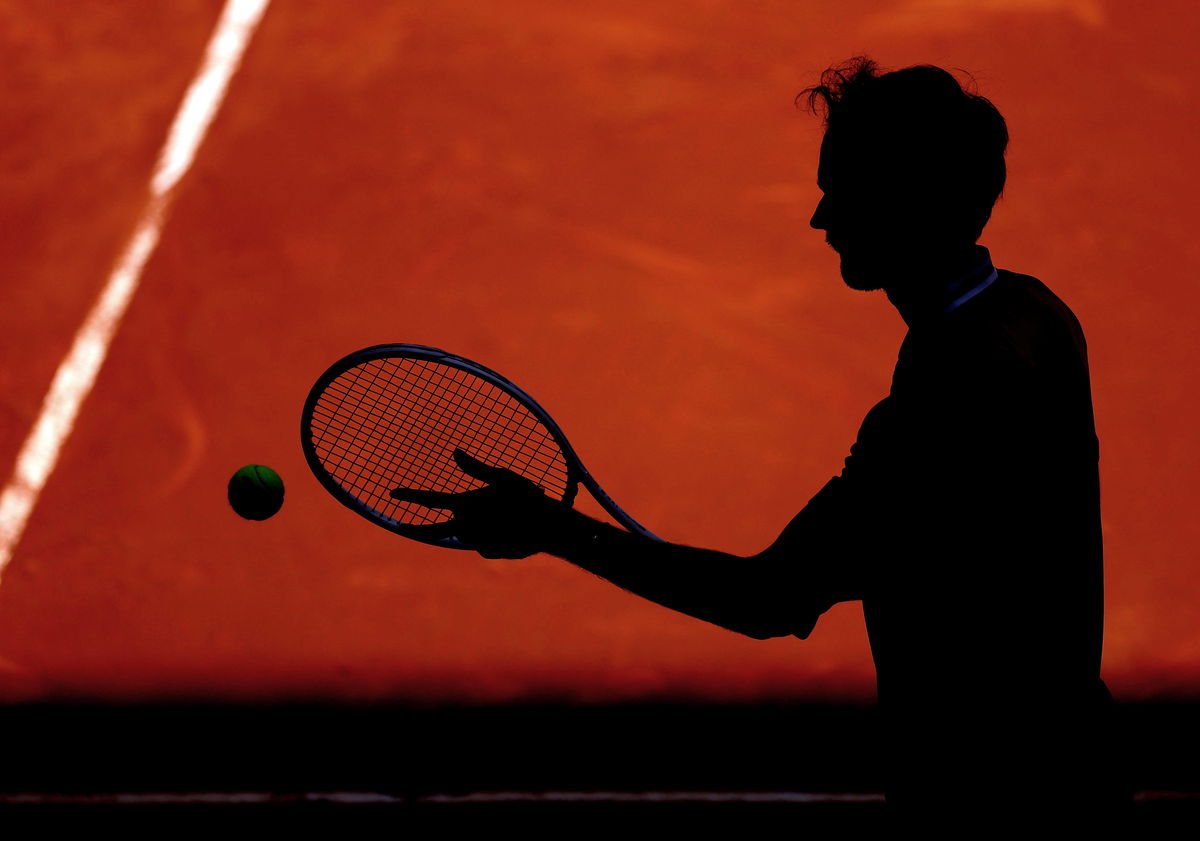Aug 5, 2025 | 3:13 PM EDT

Imago
Silhouette of Daniil Medvedev of Russia in action Mutua Madrid Open, Day 8, Tennis, La Caja Magica, Madrid, Spain – 29 Apr 2024 PUBLICATIONxINxGERxSUIxAUTxHUNxGRExMLTxCYPxROUxBULxUAExKSAxONLY Copyright: xEllaxLing/Shutterstockx 14447604av

Imago
Silhouette of Daniil Medvedev of Russia in action Mutua Madrid Open, Day 8, Tennis, La Caja Magica, Madrid, Spain – 29 Apr 2024 PUBLICATIONxINxGERxSUIxAUTxHUNxGRExMLTxCYPxROUxBULxUAExKSAxONLY Copyright: xEllaxLing/Shutterstockx 14447604av

Imago
Silhouette of Daniil Medvedev of Russia in action Mutua Madrid Open, Day 8, Tennis, La Caja Magica, Madrid, Spain – 29 Apr 2024 PUBLICATIONxINxGERxSUIxAUTxHUNxGRExMLTxCYPxROUxBULxUAExKSAxONLY Copyright: xEllaxLing/Shutterstockx 14447604av

Imago
Silhouette of Daniil Medvedev of Russia in action Mutua Madrid Open, Day 8, Tennis, La Caja Magica, Madrid, Spain – 29 Apr 2024 PUBLICATIONxINxGERxSUIxAUTxHUNxGRExMLTxCYPxROUxBULxUAExKSAxONLY Copyright: xEllaxLing/Shutterstockx 14447604av
Tennis can be glamorous, but behind the scenes, every player’s journey reveals tough struggles. Chasing titles and defending rankings takes a physical toll, but mental health plays an equally crucial role. Players like Andrey Rublev and Paula Badosa have been open about how mental health affected their game. While they spoke about external pressure or injuries that plagued their form, the bottom line was clear: mental health can’t be overlooked. And they’re not alone!
Watch What’s Trending Now!
Speaking to a Chilean newspaper, El Mercurio, Nicolas Jarry revealed that he faced one of the toughest battles between late 2024 and early 2025. Diagnosed with vestibular neuritis, a nerve inflammation causing sudden vertigo and balance issues, he spoke about a six-month depressive episode.
“When I returned to Chile, I became depressed. I didn’t want to get out of bed and I had to talk to my psychiatrist to start taking something that would help me. But in those dark moments, I thought I might not play at the level I wanted to,” he said, sharing his feelings of powerlessness and lack of motivation.
Vestibular neuritis is the main culprit behind Nicolas Jarry’s difficult year. This disorder inflames the vestibular nerve, linking the inner ear to the brain, and is usually triggered by a virus. It caused him vertigo, dizziness, and balance problems—serious issues for any athlete. Though he played most of the past year, his results reflect the struggle.
The 29-year-old is currently ranked 100th in the ATP rankings and reached the last 16 at Wimbledon. He lost a five-set thriller to Cameron Norrie—a heartbreaking defeat after all his hard work. Jarry hit a career-high No. 16 in May 2024 after reaching the Internazionali BNL d’Italia final. But his form crashed after that. He won only three more tour-level matches in 2024 and eight so far in 2025, with two coming this week at Wimbledon.
Jarry : "Je suis devenu dépressif. Je ne voulais pas sortir du lit et j'ai dû parler à mon psychiatre pour commencer à prendre quelque chose qui m'aiderait. Dans ces moments sombres, je pensais que je ne jouerais peut-être plus au niveau que je souhaitais"https://t.co/zVuP2xmRpA
— Quentin Moynet (@QuentinMoynet) August 5, 2025
At the All England Club, Nicolas Jarry spoke to ATPTour.com about his daily battle. “It’s impossible to play with this,” he admitted. “I’ve been trying to accept that and trying to see people to help me improve it. Right now, I’ve been able to improve some other skills that the injury takes away. So I’ve been able to level that and maximize whatever I have.” But not one to give up, he believes it’s a gradual process.
“Every month it’s a bit better,” he explained. “I have to reteach my body and my eyes to do certain things. Every time it’s a bit better, so while I improve in my tennis, the other skills also are improving on the same path.”
But Jarry’s tennis journey hadn’t been smooth before this either. His troubles go back longer, to when his career took a big hit in 2020 when the ITF banned him 11 months after testing positive for two banned substances. And he’s been vocal about feeling the punishment was harsher than for higher-ranked players.
Nicolas Jarry reveals his thoughts on Sinner’s doping controversy
Jarry didn’t hold back his frustration at the Rio Open in February. “I have not read what the reason for the three months was; what I did read is that they declared that there was no intention or that they took advantage,” he said, laying bare the sting of feeling treated unfairly despite pleading innocence.
For the unversed, the positive test came from a urine sample collected during the Davis Cup Finals in Madrid in late 2019. Jarry maintained that the substances entered his system accidentally through contaminated vitamins made in Brazil, a claim accepted by the ITF, which backdated his ban from December 2019 to November 2020.
Despite accepting the sanction, Jarry has expressed frustration over the perceived unfairness of his punishment compared to cases like Jannik Sinner’s, saying, “I think there are many cases where that happens, including mine, and if so, it’s that simple; only having three months, they should give it to everyone. So it’s a bitter pill to swallow.”
This year has been quite the wild ride for the Chilean. Starting outside the top 100, Jarry battled through qualifying and stormed into the fourth round at Wimbledon for the first time—his best Grand Slam showing since making the second week of a major. He even knocked out the eighth seed, Holger Rune, right in the opener.
Now, armed with a wildcard for the Cincinnati Open, what will Nicolas Jarry do next? Can he keep the sparks flying? We want to hear your thoughts—drop them in the comments!



